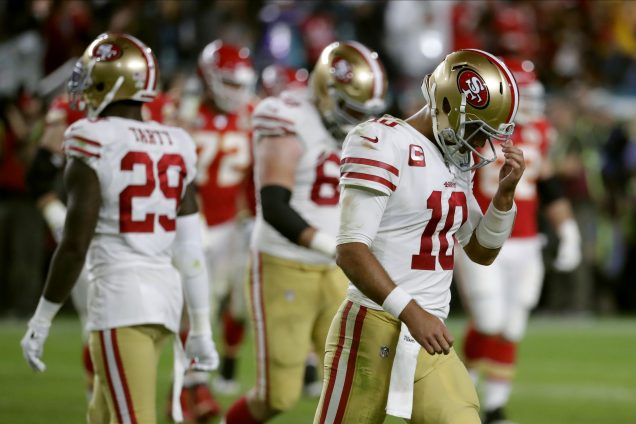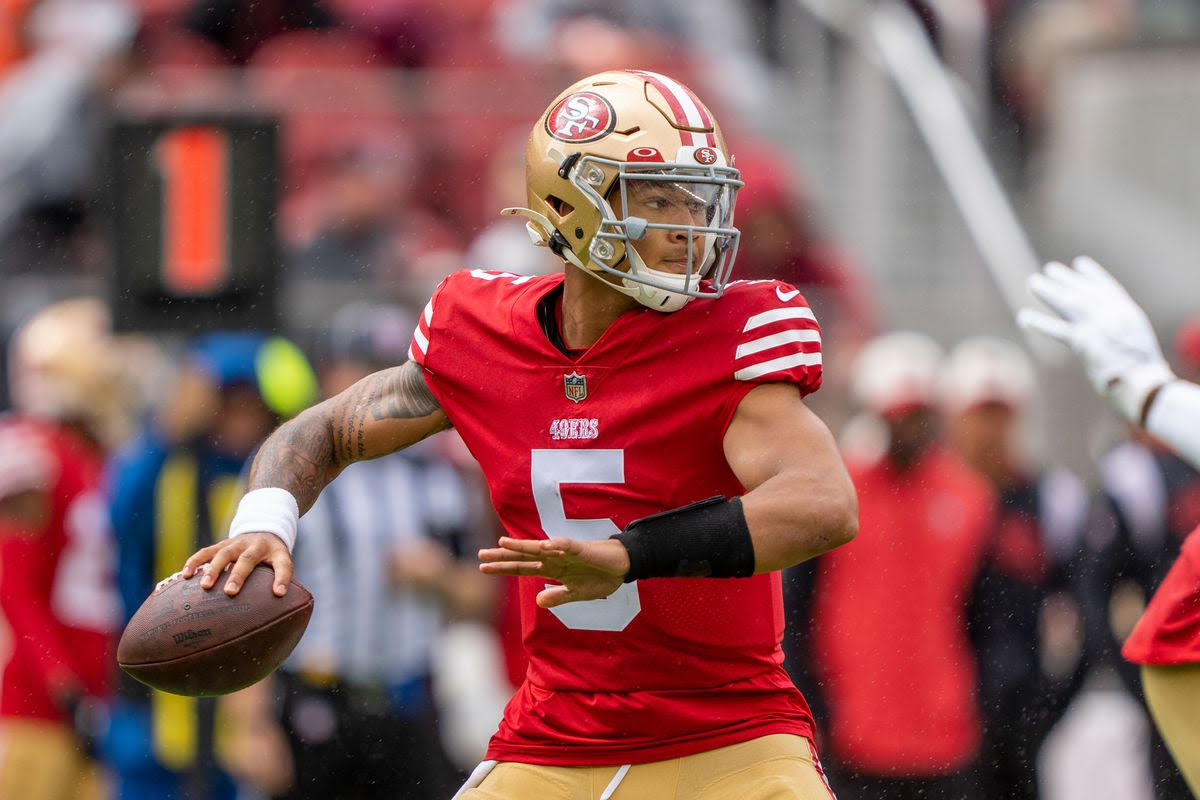The B-Gap: Remember Trey Lance? The 49ers certainly do
By Sam Robb O’Hagan
There’s one NFL play I will never forget.
It’s Super Bowl 54. The San Francisco 49ers trail the Kansas City Chiefs by four, with a third-and-ten at midfield in the fourth quarter on the wrong side of the two-minute warning. Barely over seven minutes earlier, the 49ers had a 95.3% chance to win, per ESPN analytics, holding a ten-point lead as the Chiefs faced a first-and-15 from their own 40-yard-line. A famous Patrick Mahomes bomb to Tyreek Hill and two immediate Kansas City touchdown drives later, and the 49ers’ chances have plummeted to 15.2%.
The ball is snapped to quarterback Jimmy Garoppolo, who hits the top of his drop and takes one big hitch forward, about to take one final leap of faith. As the camera loses the ball in the air, it pans down the field to two Chiefs’ defensive backs, with their backs turned to directly face the line of scrimmage. They’re each in a dead sprint, desperately chasing San Francisco’s Emmanuel Sanders, who is running free with nothing but green grass and what will be the Super Bowl-winning endzone in front of him.
This is a sure touchdown, but suddenly, Sanders pulls up, his arms nonchalantly flailing at his side as he watches the pigskin bury itself in the dirt three yards in front of him.
4th-and-10.
The 49ers would go on to lose that Super Bowl, and that overthrown post-route would stick with me forever. Quarterback play is debated in various NFL-related mediums like few other functions of any sport, and conventional wisdom has long led NFL professionals and fans alike to the conclusion that an elite passer is a necessity in any Super Bowl campaign.
Garropolo and the 2019 49ers were as direct a challenge to that notion as any team I can remember. Garropolo was — and still is — a perfectly average quarterback, not bad enough to derail a team and not good enough to lift one up.
But being in the position to throw that pass on that stage against that quarterback, that had always felt too rich for a player with his lack of notability at the most notable stop on an NFL depth chart.
Garropolo was fine (and still is!), but he was there because the 49ers were elite.
San Francisco didn’t have a great quarterback, but they had an elite defense (sound familiar?), an excellently designed offensive scheme (sound even more familiar?), and a glistening group of weapons to throw to (the alarm bells should be going off by now). It was the makeup of an undeniably elite football team that carried its mediocre quarterback.
And carried Garoppolo they did, until they could carry him no longer. Garoppolo’s failure to make that throw to Sanders, to make that one final ascent to the NFL summit on his own, became the defining moment of Super Bowl 54.
And it stuck with general manager John Lynch and the 49ers forever.
I know that because 13 months later, Lynch decided his star-studded roster wasn’t enough to carry his hopelessly mediocre quarterback.
The result of that decision was one of the most significant pre-draft trades in NFL history — three 49ers’ first-round picks were headed to Miami, a third-round pick, too, all for the guaranteed rights to draft one of the four potentially elite quarterbacks in the 2021 class. It was supposed to be the answer, the four draft picks a price worth paying to conquer the quarterback position, the one stone left unturned and the biggest stone of them all.

That answer was Trey Lance. Remember him? The 6-foot-4, 220 pound marvel that ran through defenders like they were practice pads, threw like he hated the sound barrier and whose potential invited comparisons to Cam Newton and other elite NFL quarterbacks? He was the answer, the remarkably athletic and poised quarterback with the talent to finally elevate the 49ers’ offense, to ease the stress on head coach Kyle Shanahan and his roster, to hit that do-or-die post-route in the closing minutes of the Super Bowl.
In Lance, the 49ers couldn’t have aimed further from Garoppolo, a resounding admission from Lynch that his team couldn’t go all the way with a passer that was only average, the roster he had built teeming with All-Pro talent withstanding.
Fast-forward to this season’s playoffs, and San Francisco was right back where they started. In fact, they were even further on Garoppolo’s side of the spectrum than they were in 2019. This season they were forced — as Lance went down with a season-ending injury in just his second start, and Garopollo suffered the same 10 games later — to trot out a below-average quarterback alongside an equally impressive roster on a Super Bowl push that was once again precariously relying on a limited passer.
Now that this season is over, with another Super Bowl leap fallen painfully short, it may seem like Lynch and the 49ers are ready to revert back to the devil they do know and commit to Brock Purdy next season. The impossible nature in which their season did end only adds fuel to that fire. Among other things but chief among them, the 49ers aren’t traveling to Super Bowl 57 not because their limited quarterback wasn’t throwing the ball well, but because he quite literally couldn’t throw the ball at all.
That’s not their fault or their quarterback’s, so why not run it back with Purdy and his rookie contract? Better injury luck next season and they could be right back in the Super Bowl.
It’s easy to consume the myriad of broadcast graphics displaying Shanahan’s track record with late-round quarterbacks, all while remembering just how close he got to winning it all with Garoppolo a couple of years ago, and chalk up this latest season in San Francisco to their head coach pulling off his same old tricks.
But Lynch and the 49ers didn’t want this. They really, really didn’t want this, to have to put so much responsibility on their head coach’s shoulders just to be able to pin their hopes on a small, unathletic and meagerly talented quarterback.
They wanted to avoid that fate so badly that they were willing to surrender one of the most plentiful war chests of assets in a long time to draft Lance. They were hardly desperate to secure Purdy’s services either, selecting seven players before they made him the 2022 draft’s very last pick.
The story of this season was supposed to be about Lance, about the next great San Francisco 49ers’ quarterback, not about Shanahan and the need for him to elevate yet another unremarkable 49ers’ signal-caller.
That’s what’s so funny about the 49ers’ 2022 season. It took on an incredibly captivating narrative arc — the story of the third-stringer, the rookie and the draft after-thought all in one playing the game’s most important position.
But that isn’t really the story of these 49ers. It’s the story of those 49ers, the 2019 team that was one correctly thrown ball away from winning it all. Purdy’s heartwarming story was just a spanner in Lance’s works, a quick and totally unintentional reversion back to the identity Lance was brought into change. The story of these 49ers still starts and ends with Lance, the quarterbacking prodigy still waiting for his chance.
And you best not forget about him.
